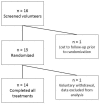Slowly Digestible Carbohydrate for Balanced Energy: In Vitro and In Vivo Evidence
- PMID: 29125542
- PMCID: PMC5707702
- DOI: 10.3390/nu9111230
Slowly Digestible Carbohydrate for Balanced Energy: In Vitro and In Vivo Evidence
Abstract
There is growing interest among consumers in foods for sustained energy management, and an increasing number of ingredients are emerging to address this demand. The SUSTRA™ 2434 slowly digestible carbohydrate is a blend of tapioca flour and corn starch, with the potential to provide balanced energy after a meal. The aim of the study was to characterize this starch's digestion profile in vitro (modified Englyst assay) and in vivo (intact and cecectomized rooster study), and to determine its effects on available energy, by measuring post-prandial glycemia in healthy adults (n = 14), in a randomized, double-blind, placebo-controlled, cross-over study, with two food forms: cold-pressed bar and pudding. The in vitro starch digestion yielded a high slowly digestible fraction (51%) compared to maltodextrin (9%). In the rooster digestibility model, the starch was highly digestible (94%). Consumption of slowly digestible starch (SDS), in an instant pudding or bar, yielded a significantly lower glycemic index compared to a control. At individual time points, the SDS bar and pudding yielded blood glucose levels with significantly lower values at 30-60 min and significantly higher values at 120-240 min, demonstrating a balanced energy release. This is the first study to comprehensively characterize the physiological responses to slowly digestible starch (tapioca and corn blend) in in vitro and in vivo studies.
Keywords: slowly digestible carbohydrates (SDC); slowly digestible starch (SDS); sustained blood glucose; sustained energy.
Conflict of interest statement
The authors are employees of Ingredion Incorporated. The studies were financially supported by Ingredion Incorporated, 10 Finderne Avenue, Bridgewater, NJ, USA.
Figures



Similar articles
-
Glycemic Index of Slowly Digestible Carbohydrate Alone and in Powdered Drink-Mix.Nutrients. 2019 May 29;11(6):1228. doi: 10.3390/nu11061228. Nutrients. 2019. PMID: 31146493 Free PMC article. Clinical Trial.
-
Starch-entrapped biopolymer microspheres as a novel approach to vary blood glucose profiles.J Am Coll Nutr. 2009 Oct;28(5):583-90. doi: 10.1080/07315724.2009.10719790. J Am Coll Nutr. 2009. PMID: 20439554
-
In vitro carbohydrate digestibility of whole-chickpea and chickpea bread products.Int J Food Sci Nutr. 2005 May;56(3):147-55. doi: 10.1080/09637480500103920. Int J Food Sci Nutr. 2005. PMID: 16009629
-
Slowly digestible starch--a review.Crit Rev Food Sci Nutr. 2015;55(12):1642-57. doi: 10.1080/10408398.2012.704434. Crit Rev Food Sci Nutr. 2015. PMID: 24915311 Review.
-
Slowly digestible starch: concept, mechanism, and proposed extended glycemic index.Crit Rev Food Sci Nutr. 2009 Nov;49(10):852-67. doi: 10.1080/10408390903372466. Crit Rev Food Sci Nutr. 2009. PMID: 19960393 Review.
Cited by
-
Formulation optimization of functional wheat bread with low glycemic index from technological and nutritional perspective.Food Sci Nutr. 2022 Sep 15;11(1):284-294. doi: 10.1002/fsn3.3060. eCollection 2023 Jan. Food Sci Nutr. 2022. PMID: 36655070 Free PMC article.
-
Deep Dive Into the Effects of Food Processing on Limiting Starch Digestibility and Lowering the Glycemic Response.Nutrients. 2021 Jan 26;13(2):381. doi: 10.3390/nu13020381. Nutrients. 2021. PMID: 33530525 Free PMC article.
-
Slowly Digestible Carbohydrate Diet Ameliorates Hyperglycemia and Hyperlipidemia in High-Fat Diet/Streptozocin-Induced Diabetic Mice.Front Nutr. 2022 Apr 15;9:854725. doi: 10.3389/fnut.2022.854725. eCollection 2022. Front Nutr. 2022. PMID: 35495933 Free PMC article.
-
Physicochemical and Functional Characteristics of RD43 Rice Flour and Its Food Application.Foods. 2020 Dec 21;9(12):1912. doi: 10.3390/foods9121912. Foods. 2020. PMID: 33371374 Free PMC article.
-
In Vitro Starch Digestibility and Glycaemic Index of Fried Dough and Batter Enriched with Wheat and Oat Bran.Foods. 2020 Sep 27;9(10):1374. doi: 10.3390/foods9101374. Foods. 2020. PMID: 32992517 Free PMC article.
References
-
- World Health Organization . Diabetics Key Facts. World Health Organization; Geneva, Switherland: 2017.
Publication types
MeSH terms
Substances
LinkOut - more resources
Full Text Sources
Other Literature Sources
Medical

